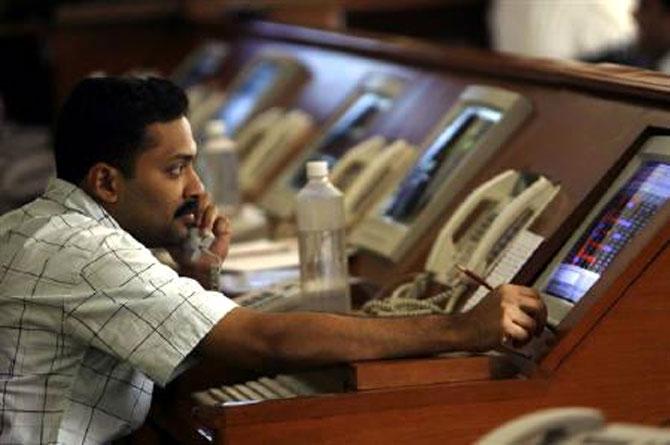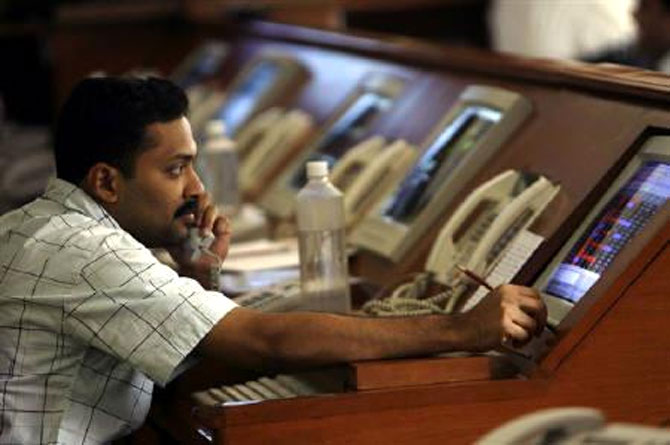‘The market’s nervousness ahead of anticipated US tariffs has led to a significant downturn in Indian equities.’

On the very first day of the financial year, the Indian benchmarks — the 50-stock Nifty and 30-stock Sensex — are down 1.16% and 1.45% respectively in anticipation of the uncertainty over US President Donald Trump’s tariffs unfolding beginning April 2.
High crude prices, slowdown in corporate earnings and the fear of FII withdrawals are adding their own fear dynamic to the market fall, independent market analyst Deepak Jasani tells Rediff.com‘s Prasanna D Zore.
On April 1, 2025, the Indian stock markets witnessed a sharp decline, with the BSE Sensex plunging 1,410 points (1.45%) to trade at 76,296, and the NSE Nifty dropping 275 points (1.16%) to settle at 23,245 at 12.30 pm IST.
Sectors like Nifty Realty (down 3.2%), IT (down 2.2%) Financial Services (down 2%) and Pharma (down 1.5%) were the main culprits dragging down the benchmarks.
Today’s market decline so far has been significant. Is this primarily due to the anticipation of tariffs expected to become effective tomorrow?
Yes, that’s one reason. Investors are apprehensive about the potential impact of these tariffs on global trade. However, it’s noteworthy that while Asian markets are either flat or up (at 12.30 pm IST), India is the only one experiencing such a decline.
This suggests a heightened nervousness among institutional investors here, leading them to reduce exposure ahead of the tariffs.
How exactly are these tariffs likely to impact Indian businesses?
The specifics will become clear once the tariffs are officially announced. There’s concern that our exports could be adversely affected. However, the final outcome may not be as severe as anticipated, and we might witness a market rally post-announcement once the uncertainty diminishes.
Do you think this marks the end of tariff impositions from the Trump administration, or is this an ongoing risk for markets?
The major risk might subside after tomorrow’s announcement. However, minor adjustments and new measures could emerge periodically.
Which sectors in India could be most impacted by these tariffs?
The impact could be widespread. Sectors like auto components, pharmaceuticals, jewellery, and breweries might be affected. Notably, the IT sector is leading today’s decline, with the Nifty IT index dropping almost 2%.
Are rising crude oil prices also contributing to market pressure?
Absolutely. Brent crude is currently trading around $74.93 per barrel. Elevated oil prices raise concerns about inflation and can negatively impact India’s fiscal deficit and corporate profit margins.
What about Foreign Institutional Investors (FIIs)? Are we seeing more outflows due to these uncertainties?
Yes, FIIs have been net sellers recently. In February 2025 alone, they offloaded over Rs 46,000 crore, contributing to the market’s downward trajectory.
Are Indian markets still overvalued, in your assessment?
Valuations remain high, especially if upcoming Q4 results don’t meet expectations. While the broader market might perform adequately, certain sectors could disappoint.
Do you foresee any levels where the market might stabilise?
If the tariff fears are alleviated post-announcement, we might see a relief rally. However, sustaining gains beyond 4% to 5% could be challenging given the prevailing uncertainties.




